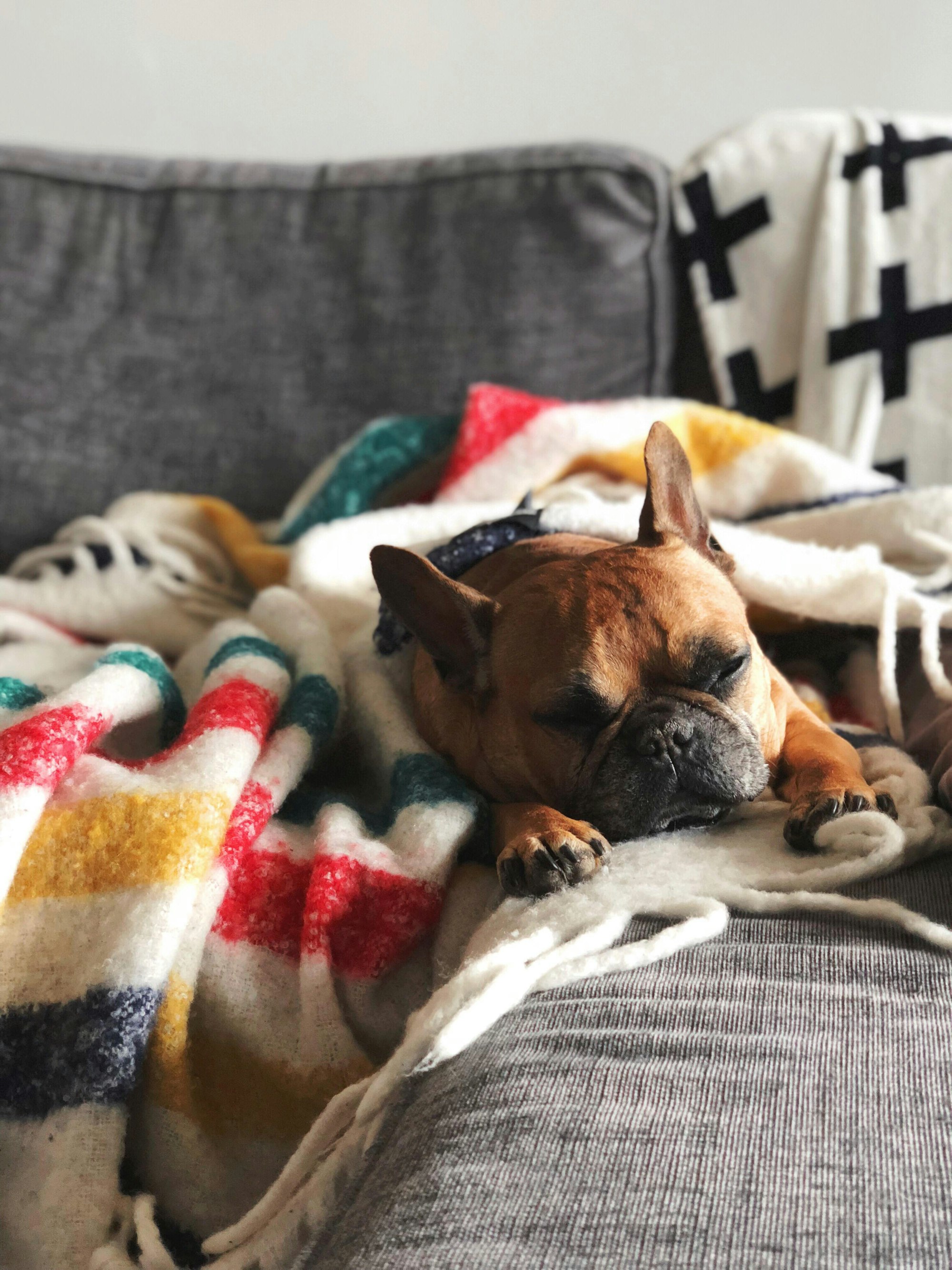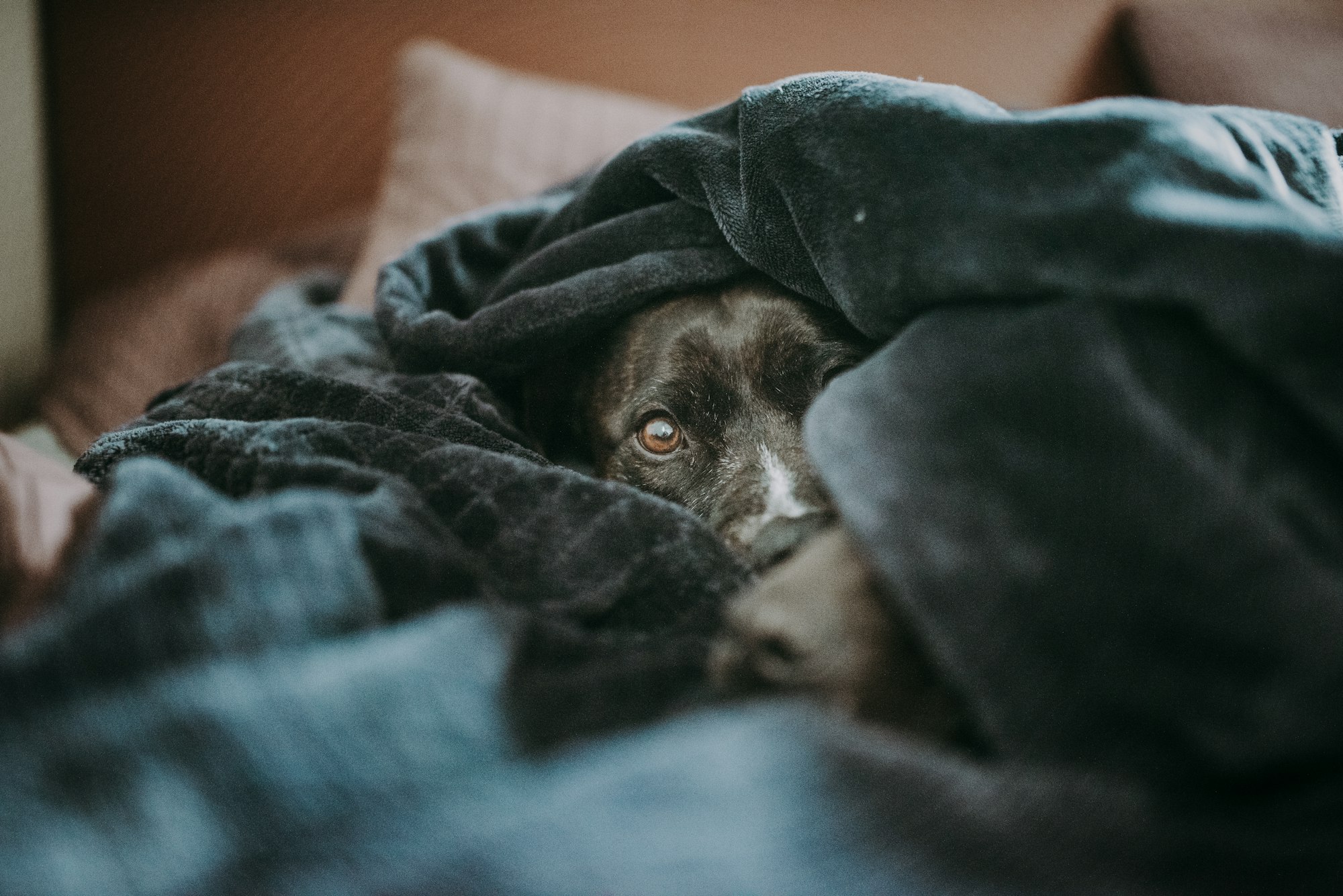Do you often find yourself scolding your dog for chewing or nibbling on your blankets? If this is a common occurrence, you’ve more likely asked yourself, “Why do dogs nibble on blankets?”
That’s why you’re here, right?
Well, there are a variety of different reasons why your pooch might decide to give your blanket (or anything in sight) a little chew. Deciding which one of them may require careful monitoring of your dog and his circumstances.

It’s Fun!
Well, sometimes the simplest reason is the best. Canines are instinctual creatures, and one of their instincts is to nibble. In fact, hunter breeds are typically the worst of all.
They can just really like to chew on things; it’s an enjoyable experience the way some people enjoy knitting, crocheting, or watching sports. They’ve been naturally nibbling on everything in sight and even their siblings when they were still in the litter, where they learned about nipping too hard.
This may be the case, in which you can find methods to curb this biting and chewing. On the other hand, it could be something else.
Anxiety
From loud noises to storms to strangers, there are many reasons why your furry companion might suffer anxiety. Fear and stress are significant causes of chewing.
One major reason may be that you leave for work, and they miss you, leading to separation anxiety. If you detect nervousness in your pet when you leave and unadulterated joy when you re-appear, these may be signs that he may be suffering this type of stress.
In high-stress situations, nibbling on a blanket can function much the way that a pacifier does for babies, providing something to soothe them and take their mind off whatever their stressor is.
If your dog paces often, whines or howls, sleeps more often than usual, and doesn’t eat as much, those may be signs of canine stress. Try to consider what might be the source of the stress to see if you can alleviate it for your buddy’s peace of mind.
Boredom
Like humans, dogs can get bored.
While they do enjoy a steady routine, they also want excitement and new experiences to enjoy. When they must spend a long time alone (such as when you are at work) or they do not get opportunities to burn off energy by running or playing, they can turn to chewing as simply . . . something to do.
Remember, it is an activity your dog may enjoy. When there’s nothing else fun, that might be what he turns to pass the time until there’s a better option.
You can minimize this by playing with your dog before you leave or taking him for a walk before and after you return, so he can expend some energy and enjoy himself.
When you can’t be there, providing him with other dogs for company can help, as can having someone else you know spend time with him and play with him.

Hunger
If you notice your dog chewing on a blanket or something else, make sure to check and see if he has food.
If not, he may just be hungry and trying to take his mind off that feeling by chomping at something else.
If this is the case, it’s a relatively simple fix by just making sure he always has enough food so that he doesn’t feel the need to occupy his teeth with other things to distract himself from hunger pangs.
Pain
Remember the pacifier analogy? It can also be relevant in this situation as well.
Like humans, dogs can experience teething pain. Chewing on items can help to mitigate that pain by providing a soothing experience, like a pacifier or chew toy can for a baby.
Similarly, if you chill a rag or chew toy in the freezer, it can help numb the pain on your dog’s teeth just like with babies.
There are other situations where your dog may be suffering pain as well and is using chewing for that calming or distracting effect. Perhaps he is suffering from allergies which results in scratching and skin irritation.
If you notice an increase in chewing habits, certainly investigate your canine friend to make sure there isn’t something causing him pain.
To Get Your Attention
Sometimes your furry friend just wants some attention. He knows that when he nibbles on your things, it causes a reaction and gets you to pay attention to him.
Like with children, it doesn’t always matter whether it is good or bad attention, just simply having you focused on him can be enough. It’s his way of saying, “Hey, I love you and I need you to spend more time with me because I miss you.”
Maybe it’s not the best way to say it, but sometimes it’s the only way he can.

Should I Be Worried About Blanket Nibbling?
No, the act itself is natural and harmless (even though you may disagree based on the condition of your belonging) . What may be a concern is whether there is a negative underlying cause such as stress, hunger, pain, or discomfort.
Investigate to make sure those options are not the reason; otherwise, your dog may just be enjoying one of his favorite pastimes or enjoying a soothing activity.
What Can I Do To Stop It?
There are a few techniques you can try.
You could acquire some cheap blankets specifically for that purpose, so he has his own to chew and won’t destroy your expensive blankets. That may not entirely solve the problem, but it might.
Otherwise, it may simply come down to training him. Help him understand commands such as “NO” or “STOP” so that he will understand that it is not okay to chew on these items.
If you struggle to do this on your own or do not have time, a professional trainer is certainly an option.
A final alternative would be to simply keep items you do not wish to get chewed in a location where he is unable to access them.
Final Thoughts
A large portion of determining whether the blanket nibbling is due to underlying causes involves monitoring your dog carefully and checking to make sure he is well.
A device that can help considerably is a smart collar such as the Fi Smart Dog Collar. While the primary function for the collar is to track your pet using GPS technology, it also has features to track important data such as how much exercise your pet is getting and it can even monitor his sleep cycles.
This information can help you to ensure that your pet isn’t sleeping too much as a result of some of the negative factors which can cause chewing and it can give you a good idea if you’re giving your buddy enough exercise to keep him from growing bored.




